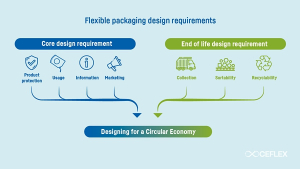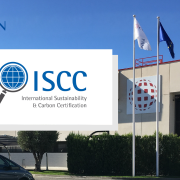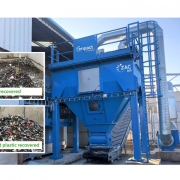CEFLEX Awarded UK Research and Innovation Funding for Flexible Packaging Design Testing Programme
The major collaboration will co-fund investigations into how flexible packaging can be designed for sorting and recycling as well as boosting circular economy applications.
CEFLEX has announced a major collaboration with UK Research and Innovation (UKRI) to co-fund investigations into how flexible packaging can be best designed to be sorted and recycled. An extensive testing programme will draw on a network of leading laboratories, universities and industry experts to generate data, to update and improve the ‘Designing for a Circular Economy’ guidelines (D4ACE) originally issued in 2020.
Results will deepen understanding of specific design elements and their impact on sorting and recyclability. Together with increasing levels of collection, sorting and recycling of flexible packaging, they will further improve the quantity and quality of recycled materials. Essential elements to help to deliver on UK Plastics Pact targets and develop a circular economy for flexible packaging across Europe.
“By strengthening our efforts through collaboration with UKRI and increasing understanding of exactly how different materials and elements in a flexible packaging structure affect sortability and recyclability, we can address essential gaps in knowledge and apply this in practice,” said Graham Houlder, CEFLEX Project Coordinator.
The UKRI Smart Sustainable Plastic Packaging (SSPP) Challenge aims to make plastic packaging fit for a sustainable future and it has identified advancing CEFLEX design guidelines as an important element in addressing some of the key barriers to change.
SSPP Challenge Director Paul Davidson said: “Films and flexibles are the final frontier in the drive towards more sustainable plastic packaging, and higher recycling rates will be essential if we are to achieve the UK Plastics Pact’s 2025 targets. I am delighted that SSPP Challenge funding will support and accelerate the testing and trials needed to provide the underpinning evidence base for CEFLEX’s Designing for a Circular Economy guidelines.”
To help prepare the programme, a peer review of existing data by Queens University Belfast, University of Maastricht and University of Gent has been undertaken. This will ensure the testing programme is targeted and effective at building on current understanding and data. The project will be co-funded by the challenge, with up to £500,000 being made available by UKRI; matched by CEFLEX stakeholder contributions.
“During development of the initial D4ACE guidelines, a number of knowledge gaps were identified that need to be filled and supported by more testing and data. This phase 2 testing programme is a catalyst for pushing state of the art understanding forward. It will improve design choices by understanding how flexible packaging moves throughout end-of-life processes and generates value in a circular economy,” explains CEFLEX design lead, Liz Morrish.
Testing will also be done to better understand if and how the flexible packaging structures, that are not currently widely sorted and mechanically recycled in existing polyethylene, polypropylene and mixed-polyolefin waste streams, can be technically sorted and recycled.
Source: CEFLEX (The Netherlands, March 02, 2022)








